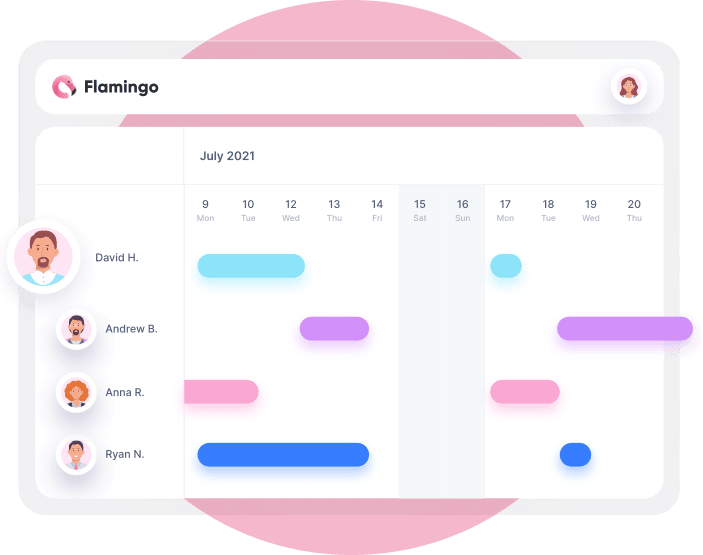
Flamingo is a leave management solution built for modern teams.
No more cluttered spreadsheets and manual data entry. Manage your entire team's leave, directly from Slack, and speed up your leave management workflow.
Learn moreIn this page, we’ll break down all you need to know about leave laws in the Netherlands.
Read on to learn about employees’ rights in regards to paid time off/annual leave, sick leave, parental leave, national/public holidays, and more.
This page is intended for reference purposes only and does not constitute legal advice. Please see official government sources or consult a legal professional for actual legal advice.
Employees in the Netherlands are entitled to a minimum of four weeks’ paid annual leave (also referred to as statutory leave or holiday entitlement).
Statutory leave expires 6 months after the end of the year in which it was given (as long as the employee has been given a reasonable opportunity to take their accrued leave).
Any non-statutory leave (leave given above the minimum requirement of four weeks per year) expires five years after it has been accrued.
It is illegal to pay out statutory leave that the employee has not used yet, even if requested by the employee. The only exception is if the employee leaves the company, when any unused leave (statutory or non-statutory) must be paid out.
Learn more about Use It or Lose It policies here.
Employees in the Netherlands are entitled to an indefinite period of sick leave. Employers must paid 70% of the employee’s wage for the first two years of sick leave. For the first year, if 70% of the employee’s wage comes to less than the minimum wage, this must be supplemented up to minimum wage.
After this time, if the employee is still sick, sick leave is paid by the government.
The Netherlands has the following public holidays:
Employees are not necessarily entitled to a day off for a public holiday. This is determined by their employment contract or collective labour agreements.
Mothers are entitled to six weeks leave before birth and 10 weeks leave after birth. In total, the employee is entitled to 16 weeks maternity leave – if the baby is born earlier, they can take more leave post-birth to equal 16 weeks. However, the employee must take at least four weeks pregnancy leave before birth.
Maternity leave increases to 20 weeks for a multiple birth (twins, triplets, or more).
Maternity leave is paid for via Maternity Benefit, from the Employee Insurance Agency.
The partner of the person giving birth is entitled to one week of parental leave, which can be taken any time within four weeks after birth. This is fully paid by their employer.
This can be extended up to another five weeks of unpaid leave, which can be taken within the first six months after birth. The employee can claim benefits from the Employee Insurance Agency during this time, of 70% of their salary.
Employees with children under the age of 8 can take up to 26 weeks of parental leave. The first nine weeks of parental leave is paid by the Employee Insurance Agency, at 70% of the employee’s regular wage (the paid portion of parental leave must be taken within the child’s first year, however).
Employees are entitled to six weeks of adoption leave when adopting or fostering a child. This is paid by the Employee Insurance Agency.
Bereavement leave is not specifically mandated by law in the Netherlands. However, a death in the family is covered by Emergency Leave, which is for any unforeseen personal circumstances that requires an employee to take time off work immediately.
Employers are required to grant a reasonable request for Emergency Leave, during which the employee’s salary must be paid.
Leave for a funeral of a family member is not covered by law, but may be covered by employment contracts or collective labour agreements.
What is Bereavement Leave? Click here to learn more.
https://business.gov.nl/regulation/leave-schemes/

No more cluttered spreadsheets and manual data entry. Manage your entire team's leave, directly from Slack, and speed up your leave management workflow.
Learn more